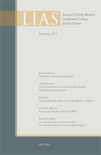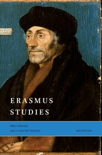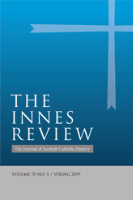
LIAS-Journal of Early Modern Intellectual Culture and its Sources
Scope & Guideline
Fostering Innovative Perspectives on Historical Ideas
Introduction
Aims and Scopes
- Interdisciplinary Analysis of Early Modern Intellectual Culture:
The journal emphasizes a multidisciplinary approach, encouraging exploration across history, literature, philosophy, and science to understand the intellectual milieu of the early modern era. - Study of Manuscript Sources and Historical Texts:
A significant focus is placed on the examination and interpretation of manuscripts and historical texts, providing new insights into the knowledge and practices of the time. - Contextualization of Education and Scholarly Networks:
Research often centers on educational institutions and their roles in disseminating knowledge, particularly examining the influence of colleges and networks of scholars in shaping intellectual discourse. - Exploration of Communication and Publication Practices:
The journal investigates how ideas were communicated and published, analyzing periodicals, correspondence, and printing practices that facilitated the exchange of knowledge. - Cultural and Religious Intersections in Intellectual Thought:
It also addresses the intersections of culture and religion, particularly in the context of Catholic Reformation, exploring how these elements influenced intellectual developments.
Trending and Emerging
- Integration of Medical Knowledge and Practices:
Recent papers highlight an increasing interest in the medical knowledge and practices of the early modern period, indicating a growing recognition of its significance within the broader intellectual culture. - Comparative Studies of Academic Periodicals:
There is a trend towards comparative analyses of academic periodicals from the early modern era, exploring their roles in shaping scholarly communication and intellectual exchange. - Investigation of Educational Institutions' Impact:
A rising focus on the role of educational institutions, particularly Irish colleges, in the dissemination of knowledge and their influence on both national and international scholarly contexts is evident. - Cultural Exchanges and Religious Dynamics:
Themes surrounding cultural exchanges, particularly in the context of religious dynamics during the Catholic Reformation, are gaining traction, reflecting a broader interest in how these factors influenced intellectual developments.
Declining or Waning
- Focus on Scientific Methodologies in Isolation:
There seems to be a diminishing emphasis on the isolated study of scientific methodologies, especially without consideration of their broader intellectual and cultural contexts. - Narrow Historical Figures and Events:
The journal appears to be moving away from highly specialized studies of specific historical figures or singular events, indicating a shift towards broader thematic explorations. - Traditional Literary Criticism:
There is a noticeable decline in traditional literary criticism, as the journal increasingly favors interdisciplinary approaches that integrate multiple fields of study.
Similar Journals

Global Intellectual History
Advancing Perspectives on Global NarrativesGlobal Intellectual History is an esteemed journal published by Taylor & Francis Ltd, dedicated to exploring the intricate interconnections between global cultures, historical narratives, and intellectual thought from 2016 to 2024. With an ISSN of 2380-1883 and an E-ISSN of 2380-1891, this journal holds a Q2 category ranking in multiple fields, including Arts and Humanities, Cultural Studies, and History, indicating its reputable standing within the academic community. Although not openly accessible, it caters significantly to scholars and students interested in the multifaceted dimensions of intellectual history, offering critical insights and fresh perspectives that enhance our understanding of global narratives. With a Scopus ranking placing it in the upper percentiles across various categories, Global Intellectual History serves as an essential resource for advancing research and scholarly discourse in its field.

Early Science and Medicine
Revealing the Intersections of Knowledge and HealingEarly Science and Medicine is a renowned academic journal published by BRILL, dedicated to exploring the intersections between historical and medical studies. With a distinguished history since its inception in 1996, the journal caters to an interdisciplinary audience, encompassing vital aspects of History, History and Philosophy of Science, and Medicine. It enjoys commendable rankings, being in the Q2 quartile in History, among others, reflecting its significant contribution to these fields. The journal's editorial commitments aim to advance scholarly discussions on the development of medical practices, theories, and their historical contexts, making it an essential resource for researchers, professionals, and students alike. Although currently not open access, Early Science and Medicine offers comprehensive analyses and rich content that engage with and enrich our understanding of the complex relationship between science and medicine throughout history. For more information, you can find the journal at its esteemed address in Leiden, Netherlands.

Erasmus Studies
Navigating the Depths of Renaissance Scholarship: Erasmus Studies AwaitsErasmus Studies, published by BRILL, is a notable journal dedicated to the interdisciplinary exploration of historical and philosophical perspectives, primarily focusing on the life and works of Erasmus of Rotterdam and their impact through the ages. With an ISSN of 0276-2854 and an E-ISSN of 1874-9275, this journal serves as a critical resource for researchers and scholars in the fields of History and Philosophy, currently classified as Q4 in both categories for the year 2023. The journal's publication history spans from 1981 to the present, highlighting its long-standing commitment to academic discourse. Located in the Netherlands, at PLANTIJNSTRAAT 2, P O BOX 9000, 2300 PA LEIDEN, Erasmus Studies provides a platform for original research, comprehensive reviews, and scholarly discussions that foster a deeper understanding of the intellectual currents shaped by Erasmus and his contemporaries. Although it does not currently offer open access, it remains an essential tool for academics seeking to engage with the rich nuances of Renaissance thought and its ongoing relevance in today's philosophical landscape.

Documenti e Studi sulla Tradizione Filosofica Medievale
Exploring the Depths of Medieval ThoughtDocumenti e Studi sulla Tradizione Filosofica Medievale is a distinguished scholarly journal published by SISMEL EDIZIONI GALLUZZO, focusing on the rich landscape of medieval philosophical traditions. With an ISSN of 1122-5750, this journal serves as an essential resource for researchers, academics, and students interested in the interdisciplinary connections between philosophy and history. We proudly hold a Q2 ranking for both History and Philosophy in the 2023 category quartiles, reflecting our commitment to publishing high-quality, impactful research. Notably, the journal ranks impressively in Scopus, occupying the 82nd percentile in Arts and Humanities History and the 71st percentile in Philosophy. Although the journal is not open access, its curated articles explore a vast array of topics within medieval philosophy, offering a platform for critical scholarship and innovative discussions. Published from 2015 to 2022, Documenti e Studi sulla Tradizione Filosofica Medievale is central to advancing the understanding of philosophical traditions and their historical contexts.

Innes Review
Cultivating critical analyses in the realms of culture and religion.The Innes Review is a distinguished academic journal published by Edinburgh University Press, focusing on the study of culture, history, and religion. With a commitment to advancing scholarly discourse, the journal serves as an essential resource for researchers and professionals alike, providing critical insights and analyses that cater to the diverse interests within Cultural Studies, History, and Religious Studies. Established in 1996 and continuing through 2024, the journal has achieved notable recognition, reflecting its contributions through its Q3 ranking in History and Q4 rankings in Cultural and Religious Studies according to the latest metrics. While it currently operates without an open access model, the Innes Review remains accessible through a variety of academic databases and resources, underpinned by rigorous peer-review processes that ensure high-quality publications. As such, it stands as a vital platform for disseminating innovative research and fostering intellectual engagement within the humanities.

Journal of Early Modern Studies
Connecting Cultures Through Scholarly ResearchJournal of Early Modern Studies is a premier open-access academic journal published by FIRENZE UNIV PRESS, dedicated to advancing scholarly research in various interrelated fields, including Cultural Studies, History, Literature and Literary Theory, Religious Studies, Linguistics and Language, Sociology and Political Science, and the Visual Arts and Performing Arts. Established in 2012, this journal plays a vital role in disseminating critical insights into the complexities of the early modern period, positioning itself among the fast-evolving dialogue within the humanities and social sciences. Notably, it has achieved respectable rankings, with a Q2 quartile in History and Literature for 2023, highlighting its contributions to academia. The Journal's dynamic scope continues to attract an engaged readership from across the globe, aiming to foster interdisciplinary dialogue through high-quality, peer-reviewed research. With a commitment to accessibility, it provides free online access to all published articles, ensuring that knowledge is readily available to researchers, professionals, and students alike. The journal’s ongoing efforts in scholarly excellence reflect its importance in shaping the future of early modern studies.

BIBLIOTHEQUE D HUMANISME ET RENAISSANCE
Exploring the Depths of Human Thought and Expression.BIBLIOTHEQUE D HUMANISME ET RENAISSANCE is a prestigious academic journal that delves into the rich fields of humanism and Renaissance studies, providing a platform for scholarly discourse and critical analysis. Published by LIBRAIRIE DROZ SA, this journal has carved a niche for itself in the study of literature, philosophy, history, and culture during one of the most transformative periods in European history. Though currently not listed as Open Access, its rigorous peer-review process ensures that published articles meet the highest academic standards, making it an invaluable resource for researchers, professionals, and students alike. While it has experienced some fluctuations in coverage over the years, spanning various intervals since its inception in the 1970s, it continues to contribute significantly to the intellectual landscape of Renaissance studies. As scholars seek to understand the complexities of human thought and artistic expression from this vibrant era, BIBLIOTHEQUE D HUMANISME ET RENAISSANCE stands out as a vital repository of knowledge and insights.

Archai-Revista de Estudos Sobre as Origens do Pensamento Ocidental
Connecting the Dots of History, Philosophy, and Society.Archai-Revista de Estudos Sobre as Origens do Pensamento Ocidental is a distinguished academic journal published by UNIV BRASILIA in Portugal, dedicated to exploring the origins of Western thought through various interdisciplinary lenses. Since its inception, the journal has embraced Open Access publishing, ensuring that a broad audience can access its rich pool of research and discourse. Covering a wide range of subjects, including Archeology, History, Philosophy, and Social Sciences, it fosters scholarly dialogue and insights that contribute to our understanding of cultural and intellectual developments. Despite its current categorization in the fourth quartile across various disciplines as of 2023, the journal remains committed to expanding its impact in the humanities and social sciences fields. As it converges from 2019 to 2024, Archai invites researchers, professionals, and students alike to engage with innovative thinking and critical analyses that shape discourses on Western philosophical traditions.

Etudes Episteme
Challenging Conventional Thinking in PhilosophyEtudes Episteme is a prominent peer-reviewed journal published by Institut Monde Anglophone, specializing in the interdisciplinary study of epistemology and the philosophy of knowledge. Since its inception in 2002, the journal has embraced an Open Access model, enhancing accessibility and encouraging global discourse among researchers, professionals, and students in the field. With its ISSN 1634-0450, this publication not only contributes significantly to academic scholarship but also serves as an essential resource for understanding the complexities of knowledge production and dissemination. The journal's commitment to high scholarly standards ensures that it remains a vital platform for innovative research and critical analysis, fostering a deeper understanding of epistemological issues in contemporary society. Based in Paris, France, Etudes Episteme invites contributions that challenge the boundaries of conventional thinking and stimulate intellectual engagement across various disciplines.

VIVARIUM-AN INTERNATIONAL JOURNAL FOR THE PHILOSOPHY AND INTELLECTUAL LIFE OF THE MIDDLE AGES AND RENAISSANCE
Advancing Scholarship in the Philosophy of Ages Gone ByVIVARIUM - AN INTERNATIONAL JOURNAL FOR THE PHILOSOPHY AND INTELLECTUAL LIFE OF THE MIDDLE AGES AND RENAISSANCE is a distinguished academic journal published by BRILL. Established in the Netherlands, this journal serves as a crucial platform for scholars and researchers interested in exploring the multifaceted intellectual currents that shaped the Middle Ages and Renaissance. With a commendable Q2 ranking in both History and Philosophy categories, VIVARIUM holds an esteemed place in the academic community, reflecting its significant contribution to these fields. The journal covers a broad temporal scope, accommodating research published from 1963 to the present, ensuring a rich archival resource for comparative and historical analysis. Despite being a non-open access periodical, its well-circulated articles are essential readings for students and professionals alike, aiming to deepen the understanding of philosophical thought and its implications across eras. As the study of these historic periods continues to resonate in contemporary discourse, VIVARIUM stands as a beacon for intellectual engagement and scholarly dialogue.